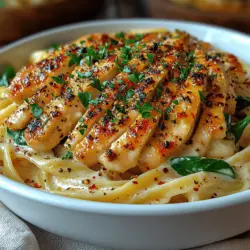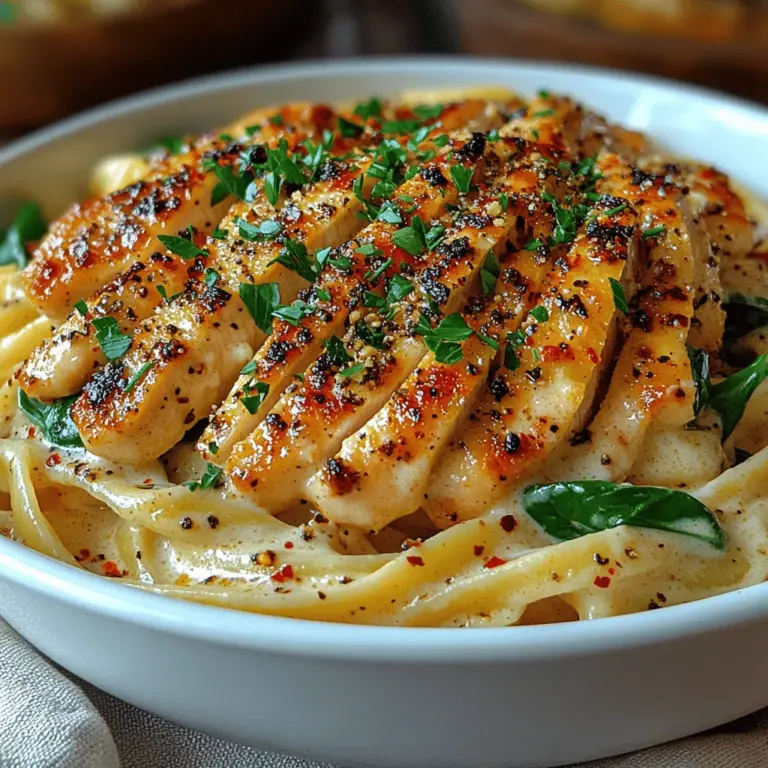Introduction
Creamy Garlic Chicken Pasta is the epitome of comfort food, blending tender chicken, al dente pasta, and a rich, creamy sauce that wraps around every bite. This dish has gained immense popularity among home cooks and food enthusiasts alike, making it a staple for weeknight dinners and a standout choice for special occasions. Whether you’re entertaining guests or simply looking for a satisfying meal at the end of a busy day, this recipe delivers a delightful combination of flavors and textures that is sure to please.
What sets this dish apart is its simplicity and versatility. With just a few key ingredients—creamy sauce, succulent chicken, and fresh spinach—you can create a meal that feels indulgent without requiring hours in the kitchen. The creamy garlic sauce serves as the heart of the dish, providing a luscious base that perfectly complements the juicy chicken and the vibrant green of fresh spinach.
The Appeal of Creamy Garlic Chicken Pasta
One of the most compelling aspects of Creamy Garlic Chicken Pasta is the richness of its flavors. The combination of garlic and cream creates a savory profile that is both comforting and satisfying. Each bite is a harmonious blend of creaminess and umami, leaving you craving more. The balance between the creamy sauce and the tender chicken ensures a delightful experience that caters to diverse palates, making it a family favorite.
From a nutritional standpoint, this dish is not only delicious but also well-rounded. The chicken provides a hearty dose of protein, essential for muscle health and repair, while the fresh spinach adds vitamins and minerals, including Vitamin A, Vitamin C, and iron. Pasta, a source of carbohydrates, gives you the energy needed to power through your day. Together, these ingredients create a meal that is not only enjoyable but also nourishing.
Ingredients Breakdown
To create the perfect Creamy Garlic Chicken Pasta, it’s essential to understand the role of each ingredient in the dish. Here’s a detailed breakdown:
– Fettuccine: This pasta is the star of the show in this recipe. Fettuccine’s flat, ribbon-like shape allows it to hold onto the creamy sauce beautifully, ensuring that each forkful is packed with flavor. While you can use other pasta shapes, fettuccine is preferred for its texture and ability to complement the rich sauce.
– Chicken Breasts: Boneless, skinless chicken breasts are ideal for this dish due to their lean nature and quick cooking time. They provide a substantial source of protein, making the dish filling and satisfying. When cooking chicken breasts, it’s crucial to avoid overcooking to maintain their juiciness and tenderness.
– Olive Oil: A staple in many kitchens, olive oil is not only a fantastic cooking medium but also adds a subtle flavor to the dish. Extra virgin olive oil is preferred for its robust taste and health benefits, such as high levels of antioxidants and heart-healthy fats.
– Garlic: This ingredient is a flavor enhancer that brings depth to the dish. Freshly minced garlic adds a pungent aroma and a savory richness that is hard to resist. Garlic is also known for its health benefits, including anti-inflammatory properties and potential immune-boosting effects.
– Heavy Cream and Chicken Broth: These two ingredients work together to create the creamy texture that makes this pasta dish so indulgent. Heavy cream adds richness, while chicken broth provides additional flavor and helps to thin out the sauce to the perfect consistency.
– Parmesan Cheese: Freshly grated Parmesan cheese is essential for adding a salty, nutty flavor to the sauce. While pre-grated cheese is convenient, it often contains anti-caking agents that can affect the melting quality. For the best results, opt for fresh Parmesan.
– Italian Seasoning: This blend of dried herbs enhances the dish’s flavor profile, adding notes of basil, oregano, and thyme. It’s a quick way to infuse the sauce with depth without needing to measure out each individual herb.
– Spinach: Fresh spinach is a fantastic addition, bringing a pop of color and a wealth of nutrients to the dish. Not only does it add vitamins and minerals, but it also complements the creamy sauce and chicken beautifully.
– Optional Ingredients: For those who enjoy a little heat, red pepper flakes can be added to the sauce for a spicy kick. Additionally, fresh parsley makes for a lovely garnish, adding a touch of freshness and vibrant color to the finished dish.
Preparation Steps Explained
Cooking the Pasta
The first step in preparing Creamy Garlic Chicken Pasta is cooking the fettuccine. Start by bringing a large pot of salted water to a rolling boil. The salt is crucial—it enhances the pasta’s flavor and helps to season it evenly as it cooks. Once the water reaches a boil, add the fettuccine and cook according to the package instructions until al dente, which typically takes around 10-12 minutes.
Be sure to stir the pasta occasionally to prevent it from sticking together. Once the pasta is cooked, reserve a cup of the starchy pasta water before draining it. This water can be a valuable addition to the sauce later, helping to achieve the desired consistency.
Importance of Salting the Water
Salting the pasta water is a simple yet essential step that is often overlooked. The water should taste like the sea—this ensures that the pasta absorbs flavor as it cooks. Without salt, the pasta can end up tasting bland, and no amount of sauce can fully rectify that. Properly salted water enhances the overall flavor of the dish, ensuring that every component shines.
In the next part of this article, we will dive deeper into the remaining preparation steps, including cooking the chicken and creating that luscious creamy garlic sauce that makes this dish a standout. Stay tuned as we explore the techniques that will elevate your Creamy Garlic Chicken Pasta to restaurant-quality perfection.
{{image_2}}
Tips for Achieving the Perfect Al Dente Texture
Cooking pasta to achieve the perfect al dente texture is essential for this Creamy Garlic Chicken Pasta recipe. Al dente, which means “to the tooth” in Italian, refers to pasta that is cooked until it is firm to the bite. Here are some tips to help you achieve the ideal texture:
1. Use Plenty of Water: Always use a large pot of water to cook your pasta. This allows the pasta to move freely and cook evenly.
2. Salt the Water: Adding a generous amount of salt to the boiling water enhances the flavor of the pasta. A good rule of thumb is to add about 1-2 tablespoons of salt for every 4 quarts of water.
3. Follow Package Instructions: Each type of pasta has a recommended cooking time. Start checking for doneness about a minute before the time indicated on the package. You want it firm but not hard.
4. Taste Test: The best way to determine if your pasta is al dente is to taste it. The center should be slightly firm but not crunchy.
5. Reserve Pasta Water: Before draining your pasta, save a cup of the cooking water. This starchy water can be used later to adjust the consistency of your sauce.
Preparing the Chicken
To make your Creamy Garlic Chicken Pasta truly exceptional, preparation of the chicken is crucial. Here’s how to prepare it:
1. Choose the Right Cut: Boneless, skinless chicken breasts are typically used for this recipe. They cook quickly and are easy to slice.
2. Pound the Chicken: For even cooking, pound the chicken breasts to a uniform thickness. This helps them cook through without drying out.
3. Season Generously: Season the chicken with salt, pepper, and any other spices you prefer, such as paprika or Italian seasoning. This ensures that every bite is flavorful.
4. Cooking Temperature: Make sure your chicken reaches an internal temperature of 165°F (75°C) for safe consumption. Use a meat thermometer for accuracy.
Importance of Seasoning and Cooking to the Right Temperature
Seasoning is a fundamental aspect of cooking, especially for the chicken in this recipe. Properly seasoned chicken enhances the overall dish, providing a flavorful base for the creamy sauce. Seasoning should be applied liberally before cooking to ensure that each bite bursts with flavor.
Cooking to the right temperature is equally important. Overcooking chicken can result in a dry texture, while undercooking can pose health risks. Always ensure that your chicken is cooked through and reaches the safe internal temperature of 165°F (75°C).
Techniques for Achieving a Golden Crust
Achieving a beautiful golden crust on your chicken not only enhances visual appeal but also contributes to the overall flavor of the dish. Here are some techniques for achieving that perfect crust:
1. Pat the Chicken Dry: Before cooking, make sure to pat the chicken dry with paper towels. This helps to achieve a better sear.
2. High Heat: Use a hot skillet and enough oil (olive oil or butter) to coat the bottom of the pan. A high initial temperature will sear the surface, creating that golden crust.
3. Avoid Crowding the Pan: Cook the chicken in batches if necessary. If the pan is too crowded, the temperature will drop, preventing a good sear.
4. Don’t Move the Chicken Too Soon: Once you place the chicken in the pan, resist the temptation to move it around. Let it sear for a few minutes until it naturally releases from the pan.
Making the Garlic Sauce
The creamy garlic sauce is the heart of this dish, bringing together the flavors of the chicken and pasta beautifully. Here’s how to make it:
1. Use Fresh Garlic: Fresh garlic provides a robust flavor that complements the creaminess of the sauce. Mince or finely chop the garlic for the best results.
2. Sauté the Garlic: After removing the chicken from the skillet, sauté the minced garlic in the remaining oil for about 30 seconds until fragrant. Be careful not to burn it, as burnt garlic can turn bitter.
3. Deglaze the Pan with Chicken Broth: After sautéing the garlic, pour in chicken broth to deglaze the pan. This process involves scraping up the browned bits stuck to the bottom, which adds depth of flavor to your sauce.
The Role of Garlic in Flavor Development
Garlic is an essential ingredient in this recipe, not just for its flavor but also for its health benefits. It adds a savory depth to the sauce, enhancing the overall taste of the dish. Garlic also has anti-inflammatory and antioxidant properties, making it a nutritious addition to your meal.
Importance of Deglazing the Pan with Chicken Broth
Deglazing the pan is a crucial step in making the sauce. The browned bits left after cooking the chicken are packed with flavor. By adding chicken broth, you lift these flavorful bits off the pan, incorporating them into the sauce. This not only enhances the taste but also adds a rich, savory undertone to your creamy garlic sauce.
Combining Ingredients
Once your chicken and sauce are prepared, it’s time to combine everything into a delicious dish.
1. Mixing Pasta and Sauce for Optimal Coverage: Add the drained pasta directly to the skillet with the garlic sauce. Toss the pasta gently to coat it with the sauce evenly. If the sauce is too thick, add a splash of the reserved pasta water to help it adhere better.
2. Discussing the Role of Spinach in the Final Dish: Fresh spinach adds color, nutrition, and a subtle earthy flavor to the dish. Stir in the spinach just before serving, allowing it to wilt slightly without losing its vibrant color. This not only enhances the dish visually but also boosts its nutritional profile.
Serving Suggestions
Presentation can elevate your Creamy Garlic Chicken Pasta, making it even more appealing.
1. Presentation Tips for an Appealing Dish: Use a large serving bowl or individual plates to serve. Twirl the pasta into nests or piles for a visually engaging presentation. Drizzle a little extra sauce over the top and sprinkle with freshly grated Parmesan cheese for added flavor and appeal.
2. How to Plate the Pasta and Chicken for Visual Impact: Arrange the chicken slices artfully atop the pasta, and garnish with freshly chopped herbs like parsley or basil for a pop of color. A squeeze of lemon juice can brighten the dish and enhance the flavors.
3. Suggestions for Side Dishes or Salads that Complement the Meal: Pair your pasta with a simple green salad dressed with a light vinaigrette to balance the richness of the creamy sauce. Garlic bread or a side of roasted vegetables can also complement this dish beautifully.
4. Ideas for Wine Pairings or Drink Options: A crisp white wine, such as Pinot Grigio or Sauvignon Blanc, pairs well with the richness of the pasta. If you prefer non-alcoholic options, serve sparkling water with lemon slices for a refreshing contrast.
Nutritional Information
Understanding the nutritional profile of your dish can help you make informed choices.
1. Overview of the Nutritional Profile per Serving: A typical serving of Creamy Garlic Chicken Pasta contains approximately 600 calories, with about 25 grams of protein, 30 grams of carbohydrates, and 40 grams of fat.
2. Discussion on Modifying the Recipe for Dietary Needs: For those following specific diets, consider using gluten-free pasta or dairy-free alternatives like coconut milk or cashew cream to make the recipe suitable for gluten- and dairy-free diets.
3. Caloric Breakdown and Health Benefits of Key Ingredients: Chicken provides lean protein, while garlic contributes antioxidants. Spinach is rich in vitamins A, C, and K, making this dish not only delicious but also nutritious.
Conclusion
Creamy Garlic Chicken Pasta is a delightful dish that combines rich flavors and comforting textures, making it a perfect choice for any occasion. The ease of preparation, coupled with the ability to customize ingredients, makes it a favorite among home cooks.
We encourage you to try this recipe and make it your own by experimenting with different vegetables, proteins, or pasta shapes. The joy of cooking comes from sharing meals with loved ones and creating memories around the dinner table. So gather your ingredients, follow these steps, and enjoy a delightful culinary experience that is sure to impress!


